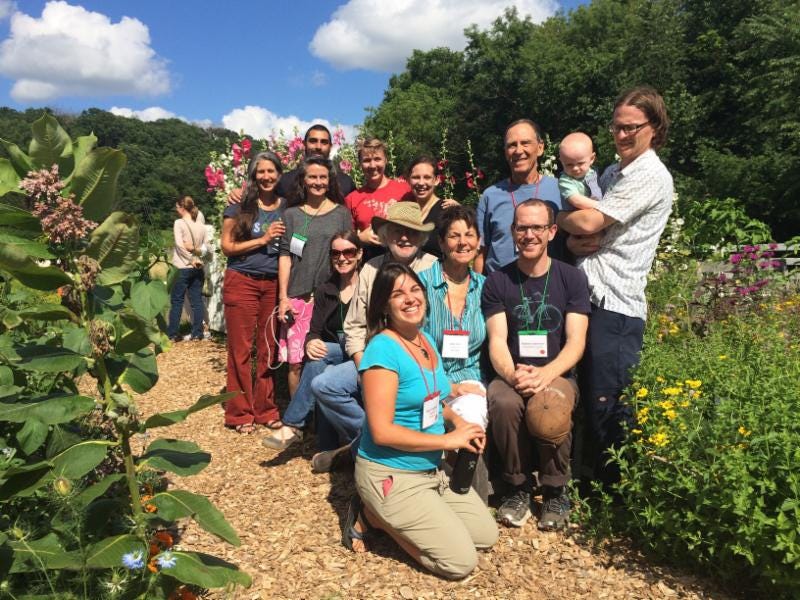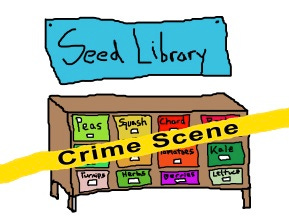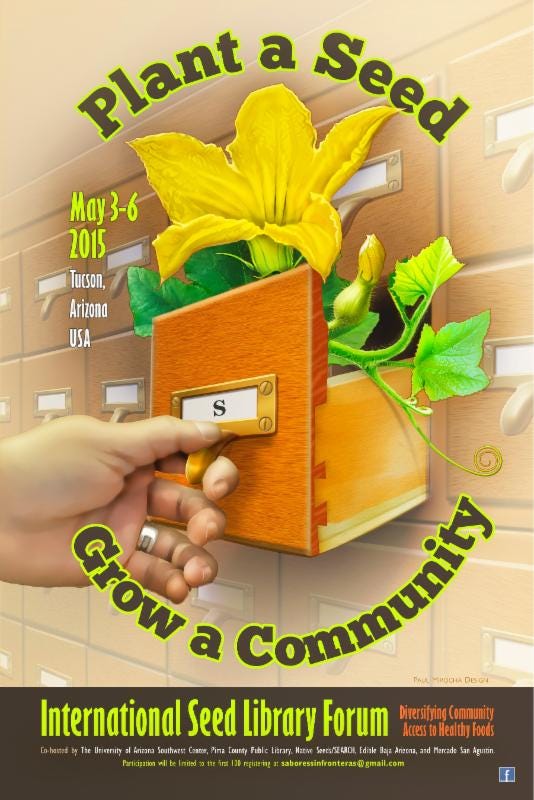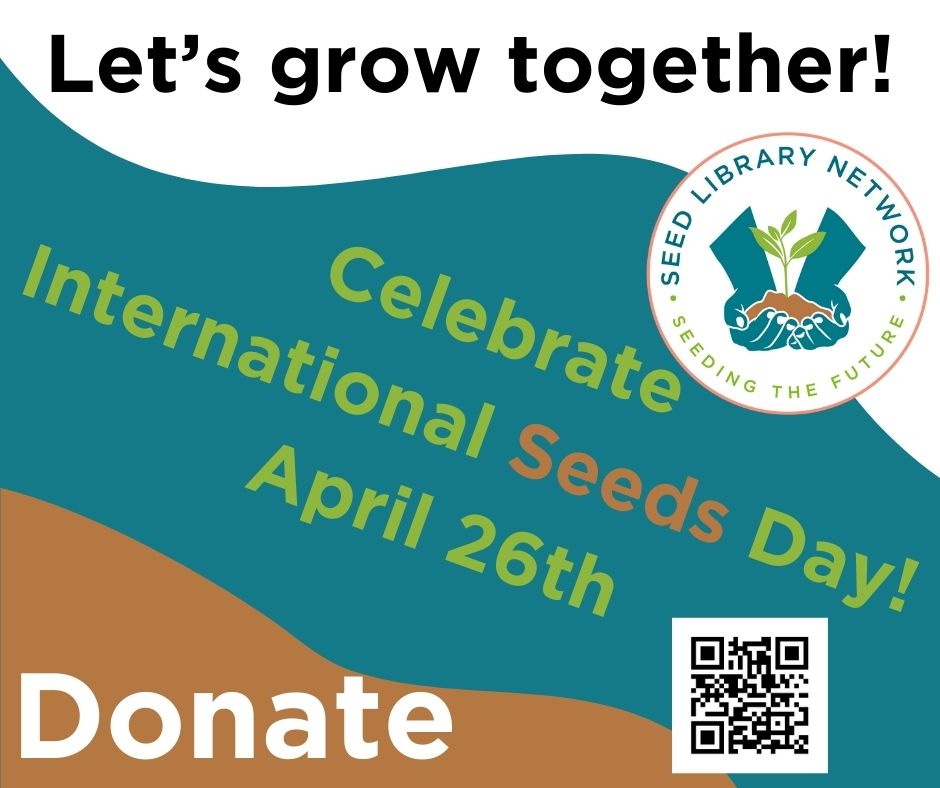The Seeds of a Global Movement: Part 2
National Seed Sharing Campaign, 2014 - 2016
By Rebecca Newburn, Co-Founder of Richmond Grows Seed Lending Library and the Founder of the Seed Library Network
When the Mechanicsburg, Pennsylvania seed library received a letter from their Seed Control Officer explaining that they were out of compliance with state seed law in June 2014, a chill set in the seed library community, freezing some projects, but it was met with a wave of determination and support across the internet. I pulled together a team of supporters and our team swiftly expanded. The Clif Bar Family Foundation’s Seeds Matter project had previously supported Richmond Grows with a grant. Their director Matthew Dillon stepped forward to have them fund the national Save Seed Sharing Campaign. With their backing, we secured legal assistance from the Sustainable Economies Law Center. Attorney Neil Thapar directed our campaign. Together, we advocated for changes to the Recommended Universal State Seed Law (RUSSL), seeking exemptions for seed libraries from commercial regulations. Simultaneously, we worked to enact protective legislation in key states to safeguard local seed sharing. (Click here to read Part 1: The Seeds of a Global Movement.)
We recognized the need for greater cohesion within the loosely connected Seed Library Network. Gary Paul Nabhan, renowned author and “father of the local food movement”, offered to organize the first International Seed Library Forum in Tucson, Arizona. This gathering aimed to unite us, celebrate our shared vision, and ignite collaboration.
Despite the legal pressures we faced, the experience of coming together at the forum was both invigorating and heartwarming. Over 100 seed librarians, many of whom I had only known through email correspondence, came together in Tucson. And, of course, it was pure joy to finally meet our beloved hosts from the Pima County Seed Library: Justine Hernandez, Kelly Wilson, and Susannah Connor.
At the summit, the group unanimously passed the Joint Resolution in Support of Seed Libraries which affirms the “creation and operation of seed libraries as an important component of our nation’s food and agricultural systems” and the “adoption and development of seed libraries into communities around the world.”

At the forum, a group of seed librarians committed to formalizing the Seed Library Network as a nonprofit to both support seed libraries and address any challenges to seed sharing in the community. Over the course of nearly two years, we convened monthly, pooling our expertise and passion for preserving seed diversity. In the summer of 2016, the Seed Savers Exchange President John Torgrimson, who was one of the attendees at the International Forum and whose hometown seed library in Duluth, Minnesota, had been one of the seed libraries that received an unannounced inspection from their state seed control official, offered to host our team for a gathering for SSE summer conference to finalize the process. They had offered to be our fiscal sponsor.

We were simultaneously working to build an organization to address the legal threat and expand to support more communities to connect with and share local seeds. The team, under the brilliant direction of Neil Thapar, pulled together numerous organizations and individuals to address the challenges, and after about a year of meeting with a collaborative team of representatives from the American Association of Seed Control Officials (AASCO), seed industry, and the Seed Library Network, AASCO voted to amend the Recommended Universal State Seed Law to exempt seed libraries from commercial regulations. So we were “back in business,” except that we never were and never intended to be a business.
After the resolution with AASCO, SSE and USC Canada (now SeedChange) offered to co-host the Seed Library Network as a project instead of a fiscally sponsored project. Since we were exhausted after this two-year struggle and all had our own projects to tend to, the group was excited to hand over the project as they were well-aligned, well-resourced, and with technical expertise. The Community Seed Network was launched. They had been thinking about doing this project for some time, and we all hoped that the fusion of our resources could propel things forward. Two of our members, Betsy Goodman and Matthew Kemshaw, continued on with them as a liaison between our groups. However, over time, since we had decided not to formalize the Seed Library Network, the group stopped meeting regularly, but we continued to host our annual conferences and provide free resources.
WE NEED YOUR FINANCIAL SUPPORT!
We are 100% volunteer-run, but we have a lot of expenses!
Here are just a few~
UpBeet! forum fees ($45/month)
Website hosting
Revamping website
Translating website and resources into multiple languages
Volunteer/management tools
Every little bit helps ensure the Seed Library Network continues to grow, and provides free resources to communities worldwide.
Roots we’ve planted
🥕 Planted and sprouted an international movement 🌱
🫶🏽 Shared knowledge on starting seed libraries to help hundreds flourish
🌿 Hosted annual Seed Library Summits to inspire and sow new ideas
🌼 Cultivated the UpBeet! Forum to connect seed librarians and let ideas germinate
Let’s grow together! 🌱🌻
💚 us at Substack
🌾 Donate to Seed Library Network (tax-deductible)
📱 Follow us on social media @seedlibraries (Instagram, Facebook, Twitter, YouTube)
📌 Get on the seed library map
Cool Beans! 🫘
Then! The first edition of Cool Beans! came out in August 2014, somewhat propelled by the legal challenges as well as our delight in sharing the amazing work happening in different communities to steward seeds. All archived editions are on the home page of our website. If you want to learn more about this moment in history, read the first edition of Cool Beans! at seedlibraries.net.
Now! New platform. New format. We are planning on sending out smaller newsletters in rhythm with the lunar cycles (either new moon 🌑 or full moon 🌕, or both). For this season, we are focusing on featuring some seed libraries. Starting at the solstice, we’ll focus on envelopes and labels. If you have envelopes, labels, or packing tips to share, be sure to fill in the Airtable form.
We’d love to be able to offer the newsletter in other languages and are starting with Spanish, French, and Portuguese. If you can help us proofread these, please email us at newsletter@seedlibrarynetwork.org.
Did you know we have an online seed librarian forum? Join us on UpBeet! Ask questions. Get inspired. Plant an idea. 🌱💡 Build a community. We’ll be highlighting resources and seed libraries on social media. Follow us!
🌏 Global Seed Library Census Update 📌
The Global Seed Library Census is a massive undertaking. As the old adage says: Many hands 🙏🏽🙏🏿🙏 make for light work. Know of a seed library not listed? Send them the link, http://bit.ly/seedcensus. 💌 (The link also has the map.) Available in 16 languages!
Minnow, Come Swim with Us!
As a former Staff Attorney at the Sustainable Economies Law Center, Neil Thapar was an integral part of the National Seed Sharing Campaign. He is currently the Director of Land and Financial Redistribution at Minnow, a nonprofit working to secure land tenure for California’s farmers of color and Indigenous communities. Minnow supports the heritage and foodways of those most affected by state-sponsored dispossession, as such conditions help repair the harms of settler colonialism that persist to this very day under capitalism and white supremacy. Their team also facilitates democratic governance of land and food systems so colonized peoples can thrive again in their cultural practices while contributing proven solutions to climate change. Check out their work at weareminnow.org.






